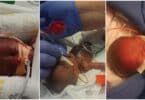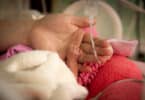The uterus is a critical component of a woman’s reproductive system. Damage or defect used to mean complete and irreversible infertility, but the recent birth of an Ohio baby offers hope.
Born at the Cleveland Clinic to an unnamed woman, the baby was the result of a transplanted uterus, which doctors took from a deceased donor. It was a medical first in the United States.
The baby’s mother, born without a uterus, had participated in a clinical trial for women with uterine factor infertility. She gave birth in June, via cesarean section, and opted to have the organ removed after her delivery.
It took 15 months for her to prepare for the donated uterus, but the procedure was “not excessively complicated,” according to her doctors.
She had to go through seven phases before implant and delivery. She supplied her medical history to the experiment team – twice. Then she had to obtain medical clearance to undergo surgery. Next, her eggs were harvested and mixed with donor sperm to produce viable embryos. Then she had to wait for a donor.
Since organs like the uterus are considered “enhancing,” rather than lifesaving, like the heart or lungs, it couldn’t be harvested until the first donor team had completed their job. That requires the patient to be living, but sustaining a person long enough to harvest organs can be difficult. By the time the second team made it in, the woman had already passed.
Doctors were initially concerned over whether the womb of a deceased donor would work.
“This was always a question mark that required research,” he said. “But this goes to the idea that a deceased donor can give her uterus, and it will function amazingly well.”
After implantation, the mother had to take anti-rejection drugs, which are necessary to keep her body from attacking the new and vital organ. Studies on pregnant women with donated livers and kidneys have found them to safe enough for pregnancy. From there, it was a delicate balance of monitoring the mother and her baby to ensure a healthy birth, as there are other risks involved as well, such as blood clotting and infection.
Thankfully, everything worked out for this new mom! She’s decided to remain unnamed, but we at GYB wish her all the joy and happiness that motherhood can bring.







